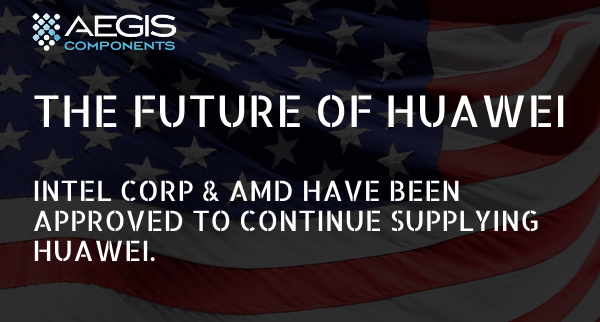
In the fear of Huawei delivering data to the Chinese government for espionage, Washington has been encouraging governments around the world to restrain the telecom giant. On August 17th, the Bureau of Industry and Security (BIS) at the U.S. Commerce Department placed Huawei on the “Entity List”. This list puts Huawei among more than 300 other Chinese firms and requires US companies to request a license from the Commerce Department to sell their products to these “Entity Listed” companies. According to Reuters, an international news organization, Intel has confirmed receiving such licenses to continue supplying certain products to Huawei.
The Trump administration contends that Huawei presents a national security threat and could pass U.S. citizens’ data to the Chinese government. The telecom giant continues to deny this, and furthermore, says it has been targeted for geopolitical reasons and because Western firms are falling behind in 5G technology.
Huawei’s PCs and Servers both employ Intel and AMD’s x86 CPUs, and Huawei’s 5G base stations also employ Intel’s Altera FPGA. Huawei’s HiSilicon subsidiary develops its own Arm-based CPUs, but their chips lack the power of those produced by Intel and AMD. To make matters worse for them, TSMC also stopped supplying Huawei to comply with tighter U.S. regulations earlier this year. Since TSMC’s rivals also rely on US equipment from firms including Applied Materials, Lam Research and Teradyne, there are few viable alternatives to TSMC.
Many analysts have regarded these U.S. sanctions as a “death sentence” or a “lethal blow” to Huawei. Estimates indicate that they have stockpiled enough semiconductors to sustain their BOM through at least the end of the year, but the company’s rotating chief executive Guo Ping told reporters “”we’re still evaluating more details”. Ping added that Huawei purchases hundreds of millions of chipsets every year for its smartphone business, and when the US restrictions announced in May went into effect, they received their last shipment of chips in mid-September.
Major chipmakers such as SK Hynix and Qualcomm have applied for licenses to sell to Huawei. China’s largest chipmaker, Semiconductor Manufacturing International Corporation (SMIC), has also submitted license applications that cover several Huawei products. AMD’s approval didn’t surprise many analysts, because AMD supplying Huawei with computer processing units for laptops doesn’t pose a major threat to U.S. national security. Huawei’s telecommunications gear is the primary concern for the U.S. authorities, and the Trump administration has placed a focus on urging countries to ban Huawei equipment from their 5G telecom networks. This has led the United Kingdom to reverse their January decision to allow it a limited role in the build out, and completely ban Huawei from their 5G networks in July. Guo Ping told reporters that if Qualcomm’s license is approved, they are willing to procure from them and use Qualcomm chipsets in their smartphones.
Aegis Components provides electronic and electrical components from verified suppliers to ensure that the quality you expect is delivered every time.
Fill up the form and our team will get back to you within 24 hours.